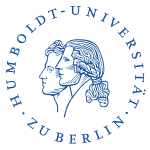Humboldt-Universität zu Berlin | |
 | |
| Motto | Universitas litterarum (Latin) |
|---|---|
Motto in English | The Entity of Sciences |
| Type | Public |
| Established | 15 October 1810[1] |
| Budget | €536.0 million (2022)[2] |
| President | Julia von Blumenthal |
Academic staff | 2,403[3] |
Administrative staff | 1,516[3] |
| Students | 32,553[3] |
| Undergraduates | 18,712[4] |
| Postgraduates | 10,881[4] |
| 2,951[4] | |
| Location | , Germany 52°31′05″N 13°23′36″E / 52.51806°N 13.39333°E |
| Campus | Urban and suburban |
| Nobel Laureates | 57 (as of 2020)[5] |
| Colors | Blue and White [6] |
| Affiliations | |
| Website | hu-berlin.de |
The Humboldt University of Berlin (German: Humboldt-Universität zu Berlin, abbreviated HU Berlin) is a public research university in the central borough of Mitte in Berlin, Germany.
The university was established by Frederick William III on the initiative of Wilhelm von Humboldt, Johann Gottlieb Fichte and Friedrich Daniel Ernst Schleiermacher as the University of Berlin (Universität zu Berlin) in 1809, and opened in 1810.[7] From 1828 until its closure in 1945, it was named the Royal Friedrich Wilhelm University of Berlin (German: Königliche Friedrich-Wilhelms-Universität zu Berlin).[8][9][10] During the Cold War, the university found itself in East Berlin and was de facto split in two when the Free University of Berlin opened in West Berlin. The university received its current name in honour of Alexander and Wilhelm von Humboldt in 1949.[11]
The university is divided into nine faculties including its medical school shared with the Freie Universität Berlin. The university has a student enrollment of around 35,000 students, and offers degree programs in some 171 disciplines from undergraduate to post-doctorate level.[12] Its main campus is located on the Unter den Linden boulevard in central Berlin. The university is known worldwide for pioneering the Humboldtian model of higher education, which has strongly influenced other European and Western universities.[13]
It was generally regarded as the world's preeminent university for the natural sciences during the 19th and early 20th century, as the university is linked to major breakthroughs in physics and other sciences by its professors, such as Albert Einstein.[14] Past and present faculty and notable alumni include 57 Nobel Prize laureates[5] (the most of any German university), as well as scholars and academics including Albert Einstein, Hermann von Helmholtz, Emil du Bois-Reymond, Robert Koch, Theodor Mommsen, Karl Marx, Friedrich Engels, Otto von Bismarck, W. E. B. Du Bois, Arthur Schopenhauer, Georg Wilhelm Friedrich Hegel, Walter Benjamin, Max Weber, Georg Simmel, Karl Liebknecht, Ernst Cassirer, Heinrich Heine, Eduard Fraenkel, Max Planck, Wernher von Braun and the Brothers Grimm.
- ^ Langner, Stefanie. "Man beruft eben tüchtige Männer und läßt die Universität sich allmählich encadrieren — Humboldt-Universität zu Berlin". www.hu-berlin.de.[permanent dead link]
- ^ "Leistungsbericht über das Jahr 2022" (PDF) (in German). Senate Chancellery of Berlin. p. 1. Retrieved 8 April 2024.
- ^ a b c "Facts and Figures". Humboldt University of Berlin. Archived from the original on 16 July 2020. Retrieved 15 June 2017.
- ^ a b c "Humboldt-Universität zu Berlin". Archived from the original on 3 December 2013. Retrieved 2 December 2013.
- ^ a b List of Nobel laureates by university affiliation
- ^ design. "Hausfarben der Humboldt-Universität". Humboldt-Universität zu Berlin (in German). Archived from the original on 7 October 2022. Retrieved 7 October 2022.
- ^ "Das moderne Original der Reformuniversität" (in German). Humboldt-Universität zu Berlin. Archived from the original on 4 July 2022. Retrieved 15 January 2018.
- ^ Hansen, Reimer (2020). Von der Friedrich-Wilhelms-Universität zur Humboldt-Universität zu Berlin. Neues aus der Geschichte der Humboldt-Universität zu Berlin. Vol. 2. Humboldt University of Berlin. doi:10.18452/5204. ISBN 978-3-9813135-7-4.
- ^ "Humboldt University of Berlin – university, Berlin, Germany". Encyclopedia Britannica. Archived from the original on 11 May 2018. Retrieved 11 May 2018.
- ^ During that period, it was also unofficially called Universität unter den Linden after its location in the former palace of Prince Henry of Prussia which his brother, King Frederick II, had built for him between 1748 and 1753 on the avenue Unter den Linden.
- ^ "Berlin's oldest university faces new challenges as it turns 200". Deutsche Welle. 15 October 2010. Archived from the original on 4 June 2019. Retrieved 4 June 2019.
- ^ hu-presse. "Facts and Figures". Humboldt-Universität zu Berlin. Retrieved 26 September 2024.
- ^ Connell Helen, University Research Management Meeting the Institutional Challenge: Meeting the Institutional Challenge, p. 137, OECD, 2005, ISBN 9789264017450
- ^ Hans C. Ohanian, Einstein's Mistakes: The Human Failings of Genius, p. 156, W. W. Norton & Company, 2009, ISBN 9780393070422